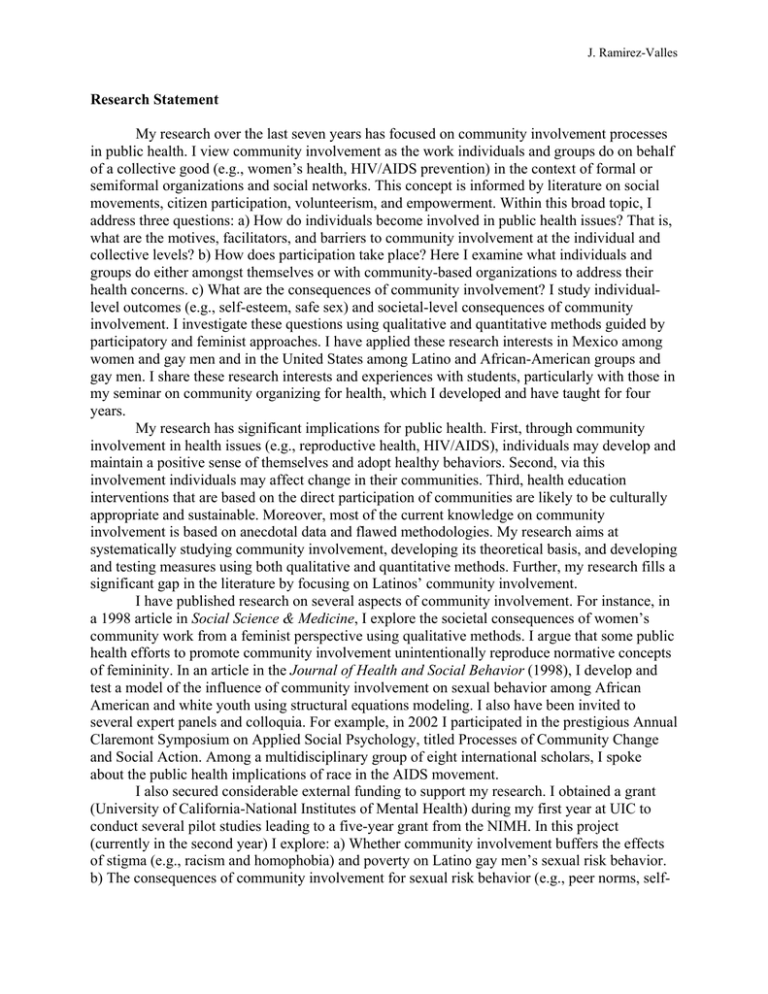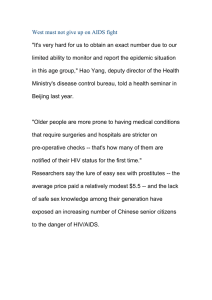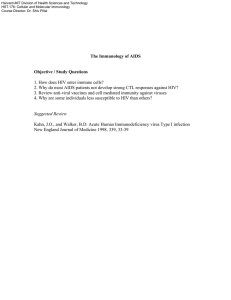
J. Ramirez-Valles
Research Statement
My research over the last seven years has focused on community involvement processes
in public health. I view community involvement as the work individuals and groups do on behalf
of a collective good (e.g., women’s health, HIV/AIDS prevention) in the context of formal or
semiformal organizations and social networks. This concept is informed by literature on social
movements, citizen participation, volunteerism, and empowerment. Within this broad topic, I
address three questions: a) How do individuals become involved in public health issues? That is,
what are the motives, facilitators, and barriers to community involvement at the individual and
collective levels? b) How does participation take place? Here I examine what individuals and
groups do either amongst themselves or with community-based organizations to address their
health concerns. c) What are the consequences of community involvement? I study individuallevel outcomes (e.g., self-esteem, safe sex) and societal-level consequences of community
involvement. I investigate these questions using qualitative and quantitative methods guided by
participatory and feminist approaches. I have applied these research interests in Mexico among
women and gay men and in the United States among Latino and African-American groups and
gay men. I share these research interests and experiences with students, particularly with those in
my seminar on community organizing for health, which I developed and have taught for four
years.
My research has significant implications for public health. First, through community
involvement in health issues (e.g., reproductive health, HIV/AIDS), individuals may develop and
maintain a positive sense of themselves and adopt healthy behaviors. Second, via this
involvement individuals may affect change in their communities. Third, health education
interventions that are based on the direct participation of communities are likely to be culturally
appropriate and sustainable. Moreover, most of the current knowledge on community
involvement is based on anecdotal data and flawed methodologies. My research aims at
systematically studying community involvement, developing its theoretical basis, and developing
and testing measures using both qualitative and quantitative methods. Further, my research fills a
significant gap in the literature by focusing on Latinos’ community involvement.
I have published research on several aspects of community involvement. For instance, in
a 1998 article in Social Science & Medicine, I explore the societal consequences of women’s
community work from a feminist perspective using qualitative methods. I argue that some public
health efforts to promote community involvement unintentionally reproduce normative concepts
of femininity. In an article in the Journal of Health and Social Behavior (1998), I develop and
test a model of the influence of community involvement on sexual behavior among African
American and white youth using structural equations modeling. I also have been invited to
several expert panels and colloquia. For example, in 2002 I participated in the prestigious Annual
Claremont Symposium on Applied Social Psychology, titled Processes of Community Change
and Social Action. Among a multidisciplinary group of eight international scholars, I spoke
about the public health implications of race in the AIDS movement.
I also secured considerable external funding to support my research. I obtained a grant
(University of California-National Institutes of Mental Health) during my first year at UIC to
conduct several pilot studies leading to a five-year grant from the NIMH. In this project
(currently in the second year) I explore: a) Whether community involvement buffers the effects
of stigma (e.g., racism and homophobia) and poverty on Latino gay men’s sexual risk behavior.
b) The consequences of community involvement for sexual risk behavior (e.g., peer norms, self-
J. Ramirez-Valles
efficacy, positive self-identity, and social support). c) The barriers to and facilitators of
community involvement in HIV/AIDS and gay related organizations. The project includes the
collection of 80 life histories and a quantitative survey of 600 Latino gay men in Chicago and
San Francisco. I already have published two articles from this study, one in AIDS Education and
Prevention (in collaboration with a doctoral student; in press), and another in Health Education
Research (2002). In the latter, I outline the theoretical framework for understanding community
involvement in the context of HIV/AIDS risk behaviors.
This line of research has led to several collaborations with colleagues at UIC and
elsewhere in the country. I am a faculty member on the AIDS International Training and
Research Program at UIC. I work with a doctoral student from Chile in this program. We
presented our study comparing white and Latino gay men’s community involvement at the 2002
International AIDS Conference. This effort also involved colleagues from University of
California at San Francisco. In another study, I am currently working with a colleague at George
Washington University on the mental health outcomes of community involvement among HIV
positive Latino gay men.
My future research plans include completing my current NIMH study and disseminating
the findings. This study has already raised several research questions. One is about the causal
effects of community involvement on health. Another related question is whether those effects
are connected to individuals’ psychosocial developmental stages (e.g., adolescence). Thus, I will
explore these questions using an intervention, or a longitudinal cohort study, and involving
Latino youth.



